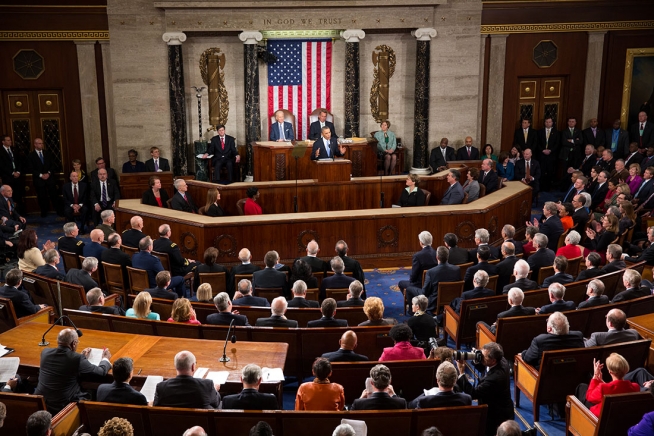February 2014, Vol. 241 No. 2
Government
Natural Gas Big Winner In Presidents State Of Union Speech

President Obama placed far less emphasis on energy policy Tuesday night than he had in any of his four previous State of the Union speeches, offering neither any surprises nor any comment on the Keystone XL Pipeline.
In fact, the president spent only about five minutes of his address, which clocked in at slightly more than an hour, on the topic – much of that devoted to praise for natural gas as a cleaner “bridge fuel” for the future.
“The all-of-the-above energy strategy I announced a few years ago is working,” he said. “America is closer to energy independence than we’ve been in decades.”
Charles D. McConnell, executive director of Rice University’s Energy and Environment Initiative, said he was not surprised by the president tone or the lack of prominence given energy policy during the address.
“I think this is pretty consistent with the fact that energy conversations and energy philosophy has never translated into any operational policy,” McConnell said. “That’s been pretty consistent from day one with this administration, and it’s this frustration that gets translated into the marketplace.”
McConnell added, however, that despite not being mentioned in the speech, he expects the 830,000 bpd Keystone XL will eventually ship oil to Gulf Coast refineries from the Canada oil sands.
“It’s just too obviously the right thing to do,” said McConnell. “I think the delays are for one reason only, and that’s to continue to extract concessions for any number of environmental concerns or issues that may be real or manufactured.”
On the evening, at least from a rhetorical standpoint, natural gas seemed to be the big winner in the energy sector, touted by the president for boosting both the economic and employment pictures in the United States, while being instrumental in helping to cut the nation’s carbon pollution levels by more than any other country.
“Congress can help by putting people to work building fueling stations that shift more cars and trucks from foreign oil to American natural gas,” President Obama said.
Don Santa, president and CEO of the Interstate Natural Gas Association of America, welcomed the president’s remarks as recognition natural gas is “driving a resurgence in U.S. manufacturing, creating good-paying American jobs, generating revenues, reducing emissions and lowering consumer energy prices.”
However, Jack Gerard, chief executive of the American Petroleum Institute, was less enthusiastic about the president’s speech, particularly concerning a renewed call to discontinue tax breaks for oil and gas companies as a means to fund alternative fuel research and development.
“Unfortunately, the president called for increased taxes on the oil and natural gas industry – he needs to close the income gap and create jobs,” Gerard said. “Punishing energy companies by raising taxes is not sound energy policy and could lead to less energy, less government revenue and fewer jobs.”
At one point, President Obama offered to work with state and local governments to come up with effective approaches for fracking and other shale recovery processes, adding he will cut red tape stalling petroleum plant construction. In other words, EPA requirements for new source performance reviews and other agency benchmarks.
McConnell, who served as the president’s Department of Energy assistant secretary for fossil energy until February 2013, said, as in other industries, oil and gas leaders are troubled there is red tape that needs to be cut in the first place.
“To suggest that you are going to cut red tape for one particular thing, but to continue to support the red tape for other things, to me is difficult to understand,” he said.
Separately, President Obama said his staff will create new criteria for oil and gas drilling on public lands, as well as guidelines aimed at cutting methane released from wells.
During his speech, the president didn’t mention the current ban on all crude exports, except for the now limited amount going to Canada, or touch on the administration’s policy concerning permits for exporting LNG to nations that do not have free trade agreements (FTA) with the United States.
Also not mentioned was coal, though the president did restate the administration will tackle global warming issues through regulatory efforts. In 2013, the White House put forward emission recommendations that would, in effect, end construction of coal-fired generation plants.
“By not even mentioning coal, it’s pretty dramatic,” McConnell said.





Comments